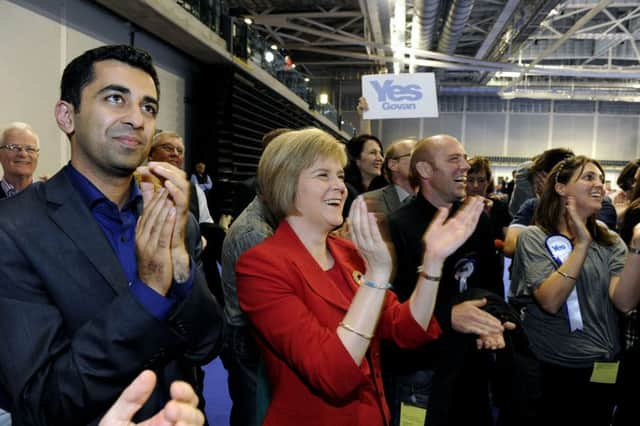Scottish Parliament election poll: SNP on course for over 50% of vote


The SNP will bolster its power base at Holyrood following the May elections with six new MSPs, a new poll suggests.
The survey indicates that 52 per cent of Scots will back SNP at the polls with 42 per cent to vote for the party in the regional lists.
Advertisement
Hide AdAdvertisement
Hide AdIt comes as opposition MSPs continue to hammer the majority party on its record of achievement in education, NHS and justice.
But just 21 per cent of voters said they will support Scottish Labour on May 5, with 16.3 per cent of those asked planning to back the Scottish Conservatives.
Just 6.5 per cent said they will vote for Liberal Democrats with 3.5 per cent pledging their support for other parties.
Around 14.4 per cent remain undecided about their voting intentions.
If the voting intentions prove correct, the number of SNP MSPs in the chamber will rise from 64 to 70.
SNP business convener Derek Mackay said it was “another very encouraging poll” for the SNP.
He added: “While Labour and Tories become increasingly divided and inward looking, the SNP are determined to build on our strong record in government and to keep Scotland moving with fresh thinking and new ideas.”
Meanwhile, Labour would drop from 37 to 26 seats under the poll results with the Scottish Conservatives to gain three, bringing their total number of MSPs to 18.
Advertisement
Hide AdAdvertisement
Hide AdA spokesman for Scottish Labour said the party was in “no doubt” about the scale of the challenge ahead but claimed it was only Labour who could bring an end to Tory austerity.
Meanwhile, Scottish Conservative leader Ruth Davidson said her party wanted to be a “real Scottish alternative” to the SNP and that the poll illustrated the need for a strong opposition.
The Survation poll for the Daily Record sought the views of 1,029 Scots aged 16 and over between January 8 and 12.
It also examined how voters have judged performance by the Scottish Government in key areas.
While First Minister Nicola Sturgeon has yet to confirm whether a second referendum will form part of the party’s 2016 election manifesto, which will be published within the next couple of months, opposition parties have seized on the SNP’s record in government as the countdown to the polls begins.
Respondents were asked how satisfied they were with performance in several areas.
Around 27 per cent said they were dissatisfied with performance on health, 25 per cent on transport, 24 per cent on economy, 22 percent dissatisfied on education and 20 per cent on justice.
Meanwhile, satisfaction with NHS ran at just under 51 per cent with roughly the same proportion satisfied on some level with they way the Scottish Government handles law and order issues. Just over 50 per cent are satisfied with the way education is run.
Advertisement
Hide AdAdvertisement
Hide AdThe research also established what voters believe should be the priority of the Scottish Government.
NHS and Social care came out on top at 70 per cent with the economy at 55 per cent and the cost of living at 40.5 per cent.
The research also examined the voting intensions of respondents on a second independence referendum.
Should a referendum on Scottish independence be held tomorrow, 44.9 per cent would vote Yes with 45.8 to vote No. Just under nine percent said they were undecided at this point.
Those most likely to vote Yes were in the 16 to 34 age group (52.8per cent). More people said they would vote Yes in Glasgow than anywhere else in Scotland (57.9 per cent).
According to the survey, those most likely to vote No were aged 55 and over (57 per cent) with the South of Scotland returning the highest proportion of those against Independence (59.2 per cent).
On the question of the referendum to leave the EU, 50.5 per cent said they would vote to stay - with 26.5 per cent wanting to leave.
Those in the youngest age group - 16 to 34 - were keenest to stay, with 55.5 per cent saying they wanted to remain as part of the EU.